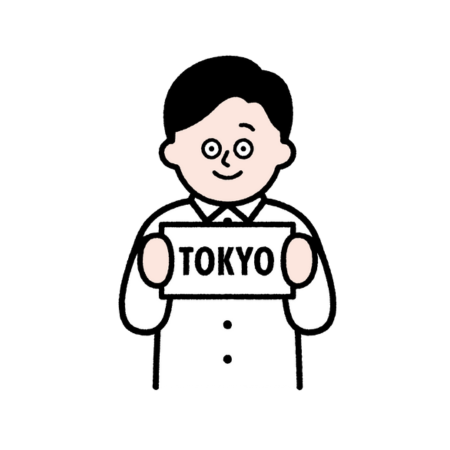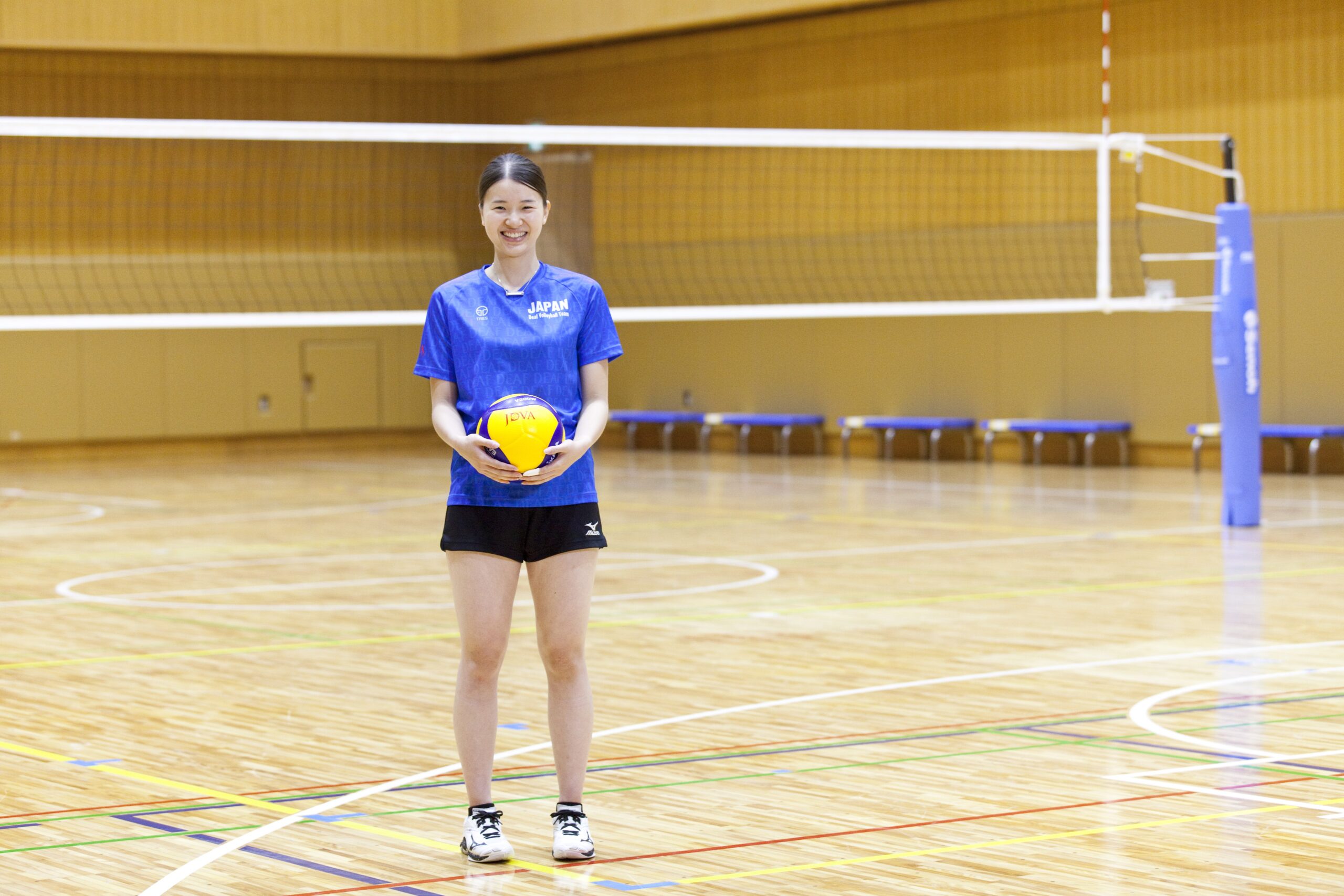
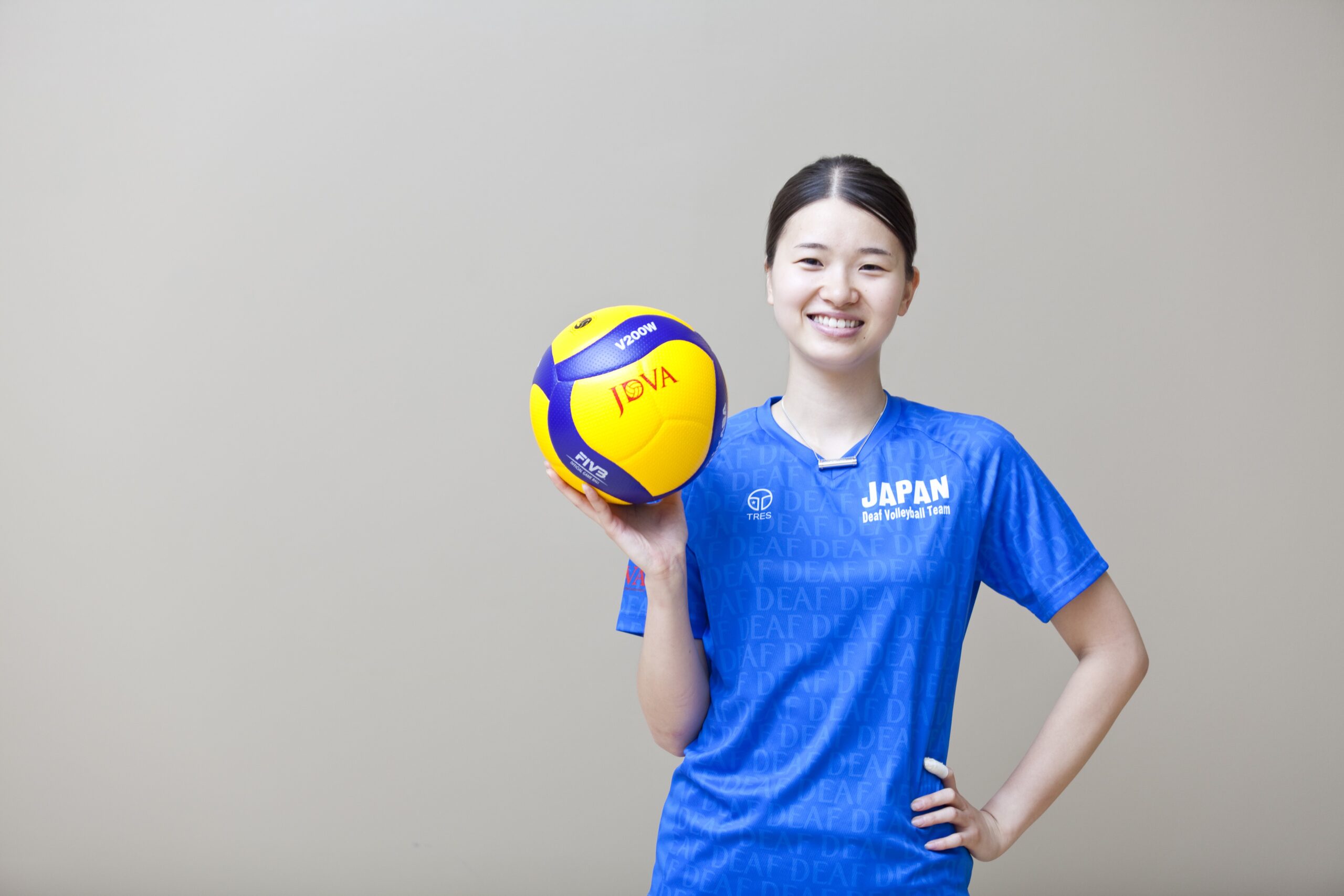
Yumi Haseyama
Born in 2000 in Shizuoka Prefecture and raised in Kanagawa Prefecture. She attended the Kanagawa Prefectural Hiratsuka School for the Deaf from elementary school to high school. She started playing volleyball in her first year of junior high school and joined the Japanese national team at the age of 15. She won a gold medal at the Samsung 2017 Deaflympics. She later found employment in a regular company and continued to represent Japan as a national team player while working.
She discovered the joy of volleyball when she realized, “I want to improve even more.”
――Can you tell us what prompted you to start playing volleyball in your junior high school club activity?
At that time, I was actually thinking of joining the baseball club (laughs). My mother and cousins played softball, and my grandfather was into baseball, so baseball was a familiar sport in my family. However, I ended up joining the volleyball club because I received a strong invitation from my seniors. I think I was invited because I was relatively tall for my age back then, standing at 160cm.
I’ve always loved moving my body since I was a child. I used to take hip-hop dance classes with friends and play baseball and volleyball for fun. However, I was on the plump side in terms of my body shape. I loved eating snacks. But when I started playing volleyball, I lost a lot of weight and was even called ‘bean sprout.’ It was because our club’s practices were quite intense.
――Why do you think you were able to continue with such demanding club activities?
I believe it’s because I have a competitive and determined personality. In my volleyball club, there was a classmate and fellow Japanese national team player, Mio Nakata, who had better athleticism than me and rapidly improved, earning a spot in the starting lineup ahead of me, even though we played different positions. I felt really frustrated, but that feeling became my driving force, and I think it’s why I didn’t quit, even when it was tough.
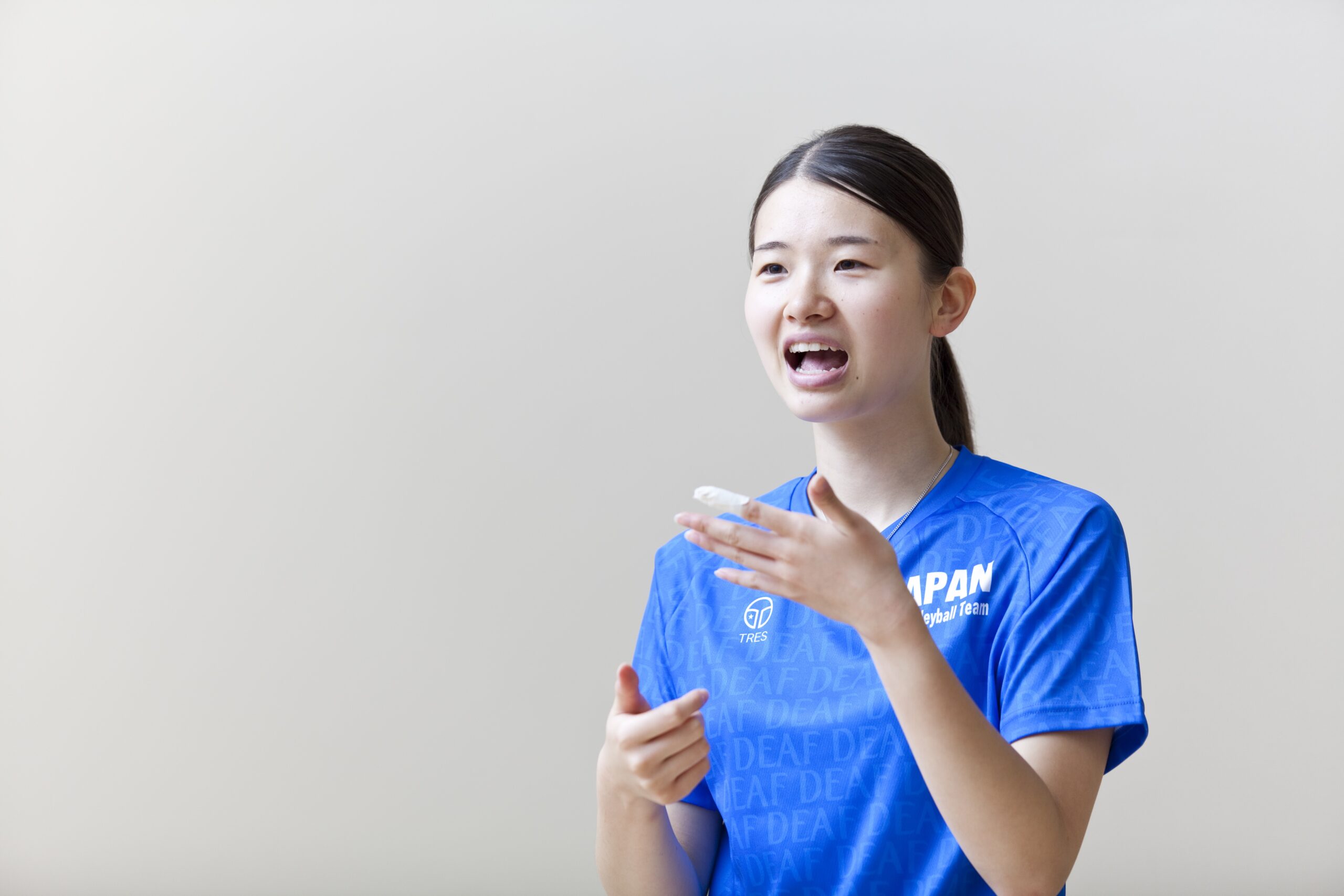
――Haseyama-san was called up to the Japanese national team when she was in your third year of junior high school at the age of 15. Do you remember what it was like back then?
I didn’t have much interest in the national team at first, but my feelings changed when I participated in the JOC Junior Olympic Cup representative selection tournament during my third year of junior high school. Until then, I hadn’t really felt the need for it, as I had been playing with athletes from the deaf school. However, at this selection tournament, hearing athletes were also participating, and I realized the high level of competition around me. There were so many skilled players, and I felt like I had a long way to go. It was at that moment when I thought, “I want to improve even more,” that I truly awakened to the excitement of volleyball. As I continued to work hard in my training, Coach Mitsuhiro Muneta approached me and asked, “Wouldn’t you like to join the Japan national team camp?”
――How often do you practice?
As a member of the Japanese national team, we have training camps together about 1 to 2 times a month with players in their late twenties and university students who come from all over the country. These camps usually last for 2 to 3 days and take place in various locations such as Kobe City in Hyogo Prefecture, Tokyo, and Okinawa Prefecture. On a personal level, I practice on weekends and holidays, and I also go to the gym during my free time.In terms of communication, the team’s rule is “not to leave things unexplained and to keep talking until everyone understands.” During matches, when there’s time, like when the ball goes out, we make eye contact and communicate using sign language, oral communication, and gestures until we reach a mutual understanding. Additionally, during evening meetings at our training camps, we sit down together, regardless of seniority, to have discussions while ensuring that everyone comprehends the matter at hand. Volleyball is a team sport, so even off the court, we make an effort to communicate with each other without regard to seniority or hierarchy, valuing everyone’s feelings and working to eliminate communication barriers.
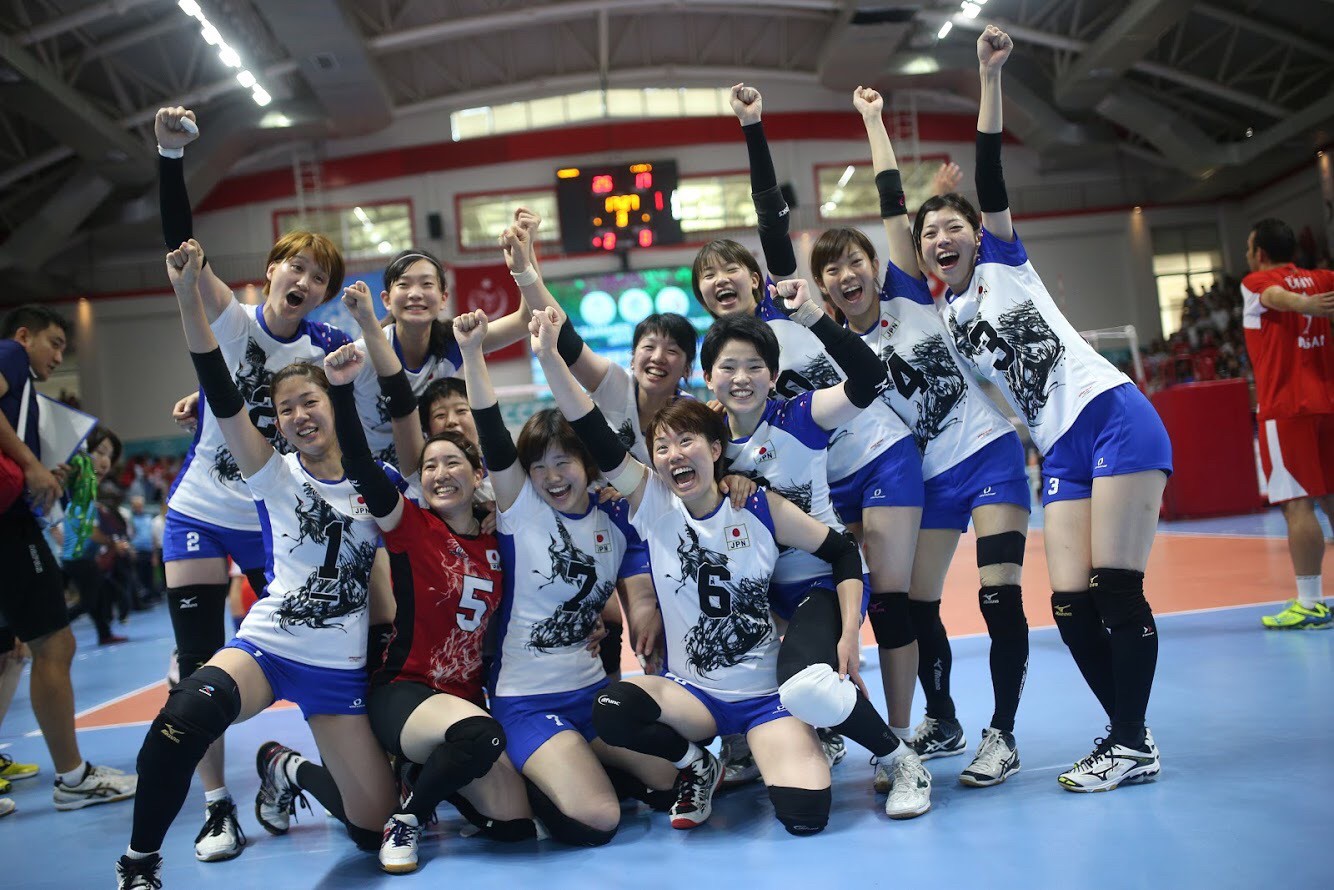
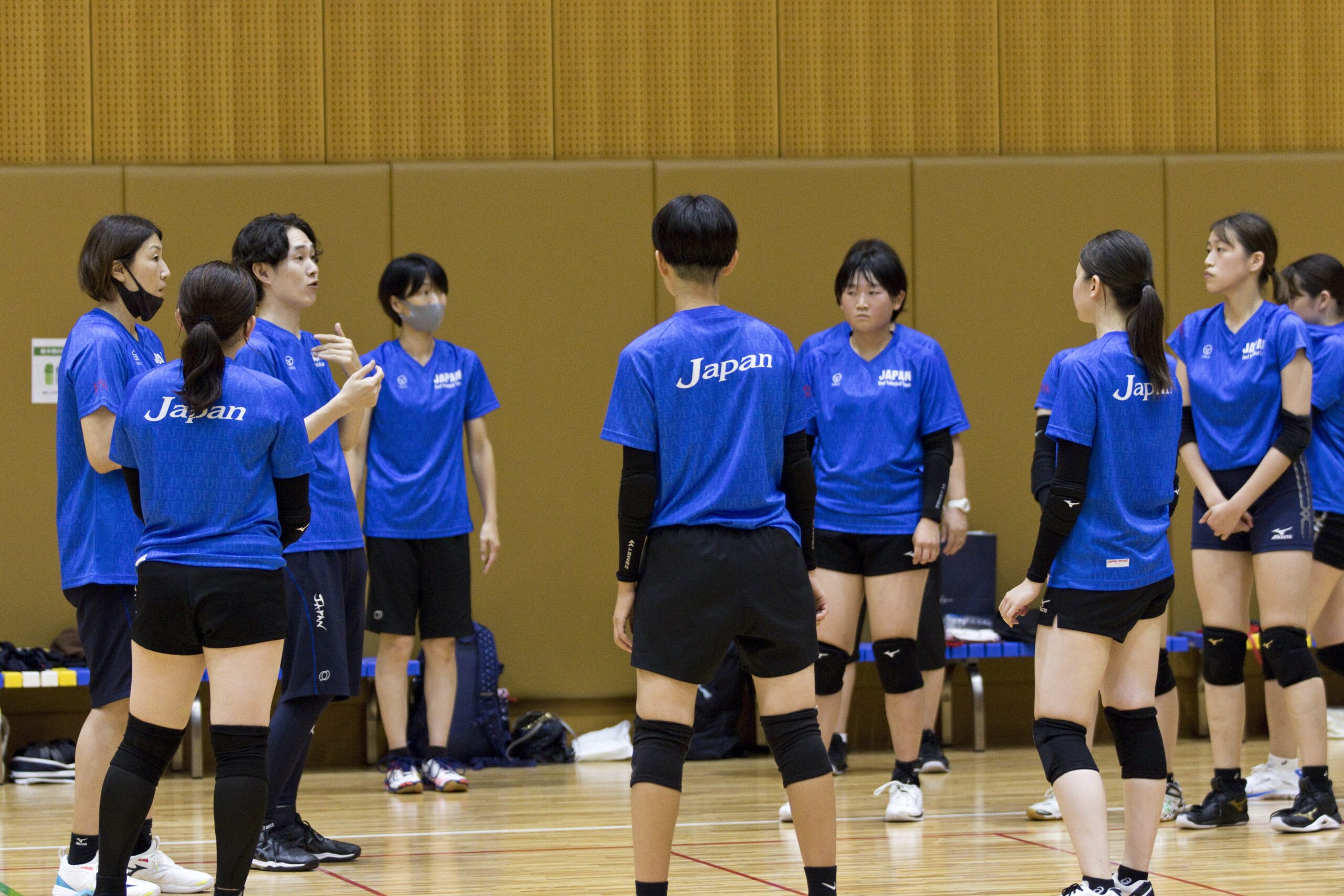
Aiming for Team Play That Inspires Spectators to Cheer
――Please tell us about the current characteristics of the Japan national team.
We aim for a fast-paced attacking style as a team. Since we are generally shorter in height, the style of setting up big tosses for spikes, like we did in the Samsung 2017 Games, would get blocked. Therefore, we excel in setting up low and fast tosses, attacking with timing that the opponent’s block can’t catch up to. My position is a Middle Blocker (MB), and my primary role is to block against the opponent’s attacks. In this position, which generally has taller players worldwide, it’s challenging for me, at 166cm, to directly score points with blocks. However, I focus on getting one-touch blocks and setting up opportunities for my teammates’ attacks. In offense, I move a lot to confuse the opposing team and draw blockers, even though it’s challenging.
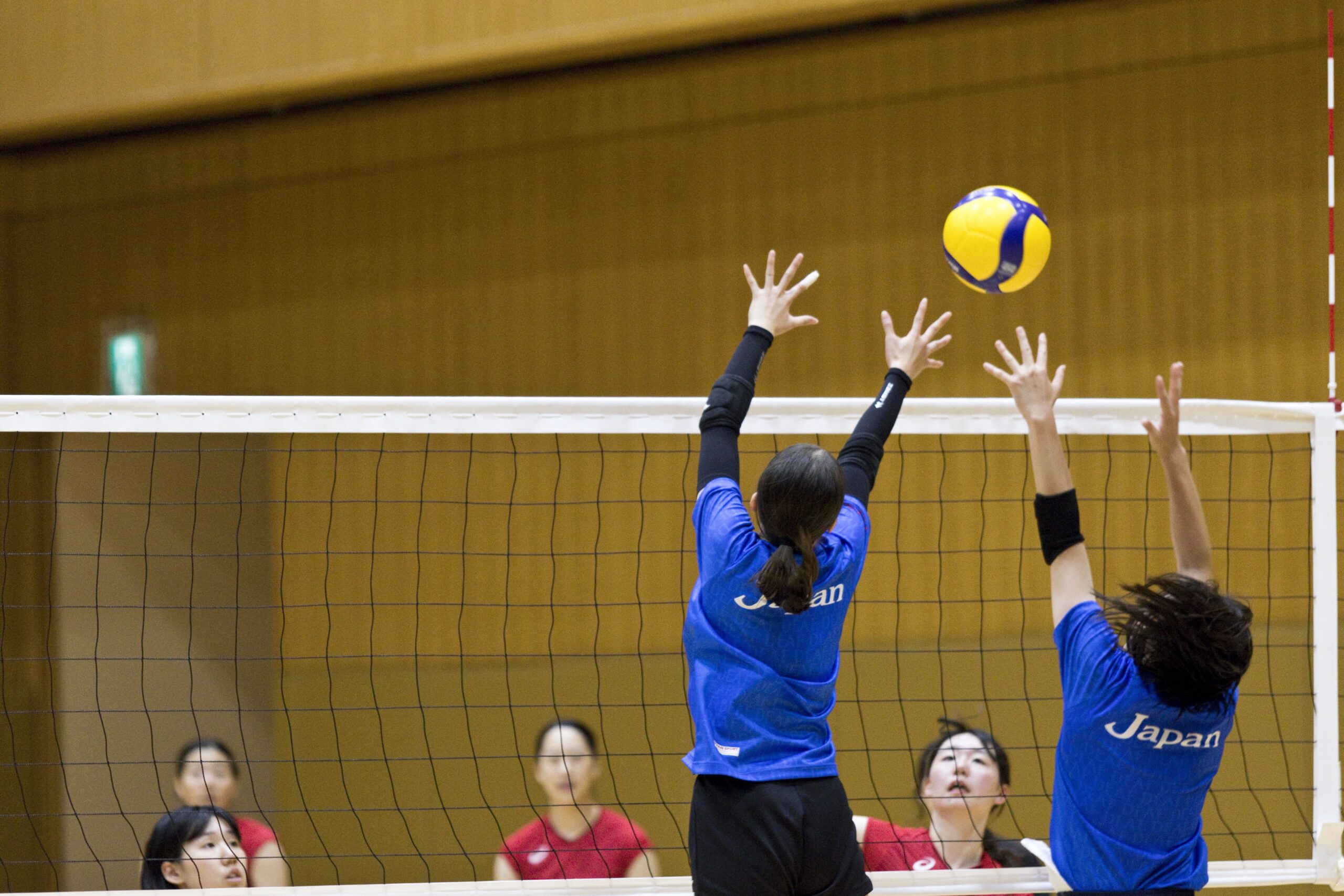
――For those who are new to Deaf Volleyball, please introduce some of the standout players to watch.
While I would love for everyone to pay attention to all the players, if I had to pick, the first player to highlight is Sayaka Umemoto. She is two years younger than me and currently a sophomore in college. Her position is Left (OH – Outside Hitter), and she serves as the team’s ace. She has remarkable jumping ability and is known for her powerful volleyball skills. Watching her deliver incredible spikes is truly a sight to behold. She’s a player to watch, excelling both in offense and defense.The second player is Sayuri Hiraoka, who plays as a Right (OP – Opposite). Despite being shorter than me, she possesses great power and is a strong spiker capable of knocking down the opponent’s block. She has a different style of scoring compared to Umemoto-san, and I hope people will also keep an eye on her.The third player is Mio Nakata, who is also my childhood friend. She is a versatile Setter (S) who can set the ball with great precision. Many of our team’s offensive options are thanks to her excellent sets.
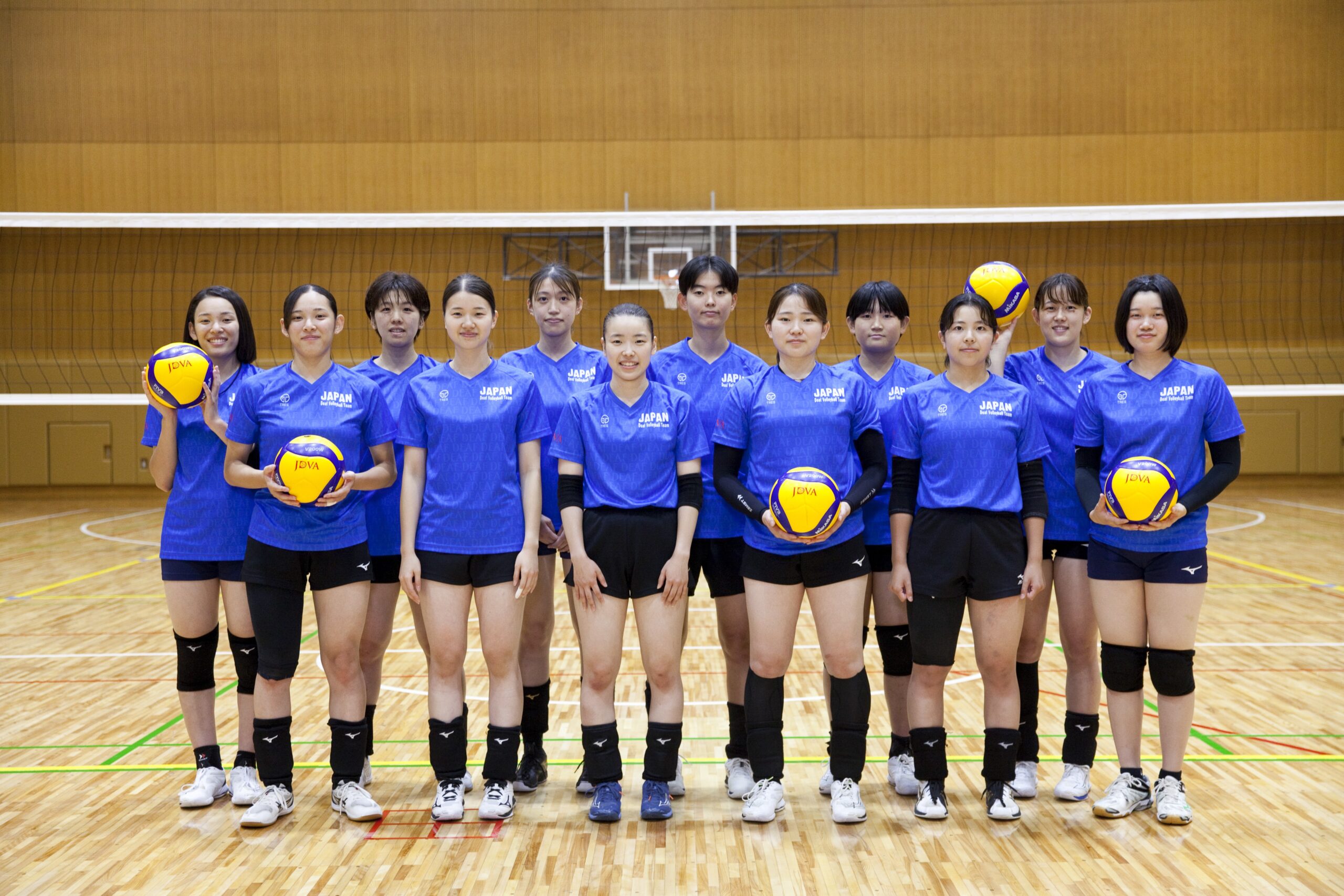
――What are your future goals?
My future goal is to win a gold medal at the Tokyo 2025 Deaflympics. In the previous competition, the Cassius do Sul 2021 Games, we aimed for a consecutive victory, but we had to withdraw from all events due to the COVID-19 infection within the Japanese delegation. In Tokyo, I want to aim for the gold medal, both as a form of redemption and as a team. Personally, my goal is to improve my speed and jumping ability to be able to block the opponent’s attack as quickly as possible and contribute to the team. As a team, we want to enhance the quality of our first-receive and connect it to strong attacks. We also aim to play in a way that makes spectators want to cheer for us.I still remember the excitement in the arena during the final of the Samsung 2017 Games, where the crowd’s enthusiasm grew with every point scored. I could strongly feel the vibrations, the atmosphere, and the heat generated by everyone’s cheers. In the Tokyo Games, I intend to hone my skills to receive support from everyone once again and work hard to become an outstanding team that surprises people with our performance.
Balancing Work and Personal Life: Striving to Manage Time Effectively
――From here on, we’d like to ask not as an athlete but about you personally and what you value in your everyday life. What do you enjoy outside of volleyball?I enjoy drawing and creating handmade crafts. During the Cassius do Sul 2021 Games, I made charms for everyone. Lately, I’ve been painting watercolor portraits of couples for my friends’ weddings. I have a personality that can’t stand leaving things half-done, so I end up redrawing until I’m satisfied, which sometimes leads to sleepless nights… (laughs). While persevering until the end is a strength of mine, on the flip side, I might also have the weakness of being reluctant to give up.
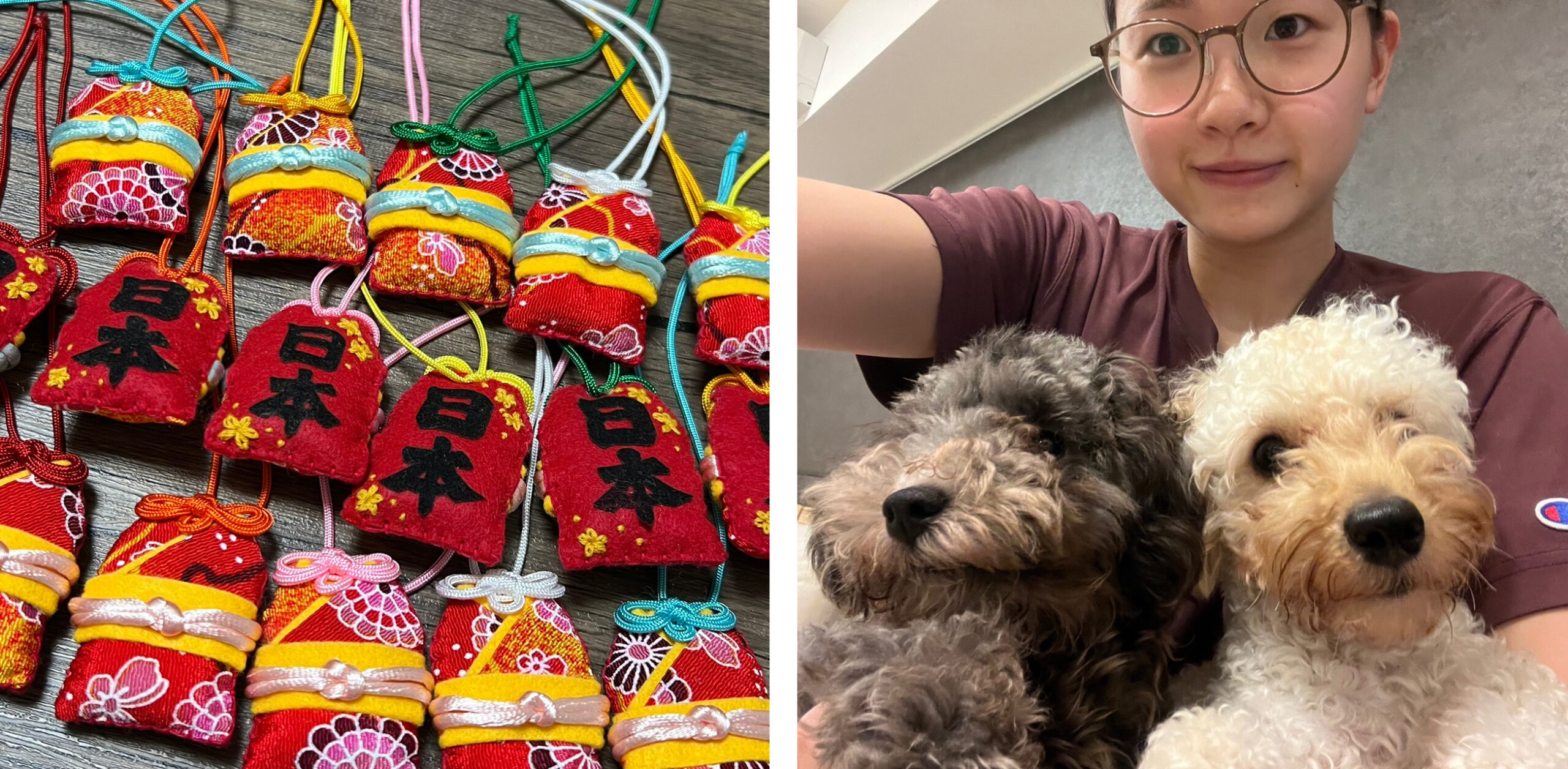
――What do you like to do on your days off?
I’m not on an athlete’s schedule, so I work from Monday to Friday and allocate Saturdays and Sundays for training, which means I don’t have many full days off. However, I do try to set aside my own rest days for managing my health. I’m an outdoor enthusiast, so I like to go to places with mountains, rivers, or the sea to refresh myself. I enjoy going on gourmet tours, it is one of my ways to de-stress. Although I didn’t have many opportunities this year, in May, I went on a trip to Ishikawa Prefecture with friends. We even drove on the famous Chirihama Beach where you can drive on the sand. It was so enjoyable.
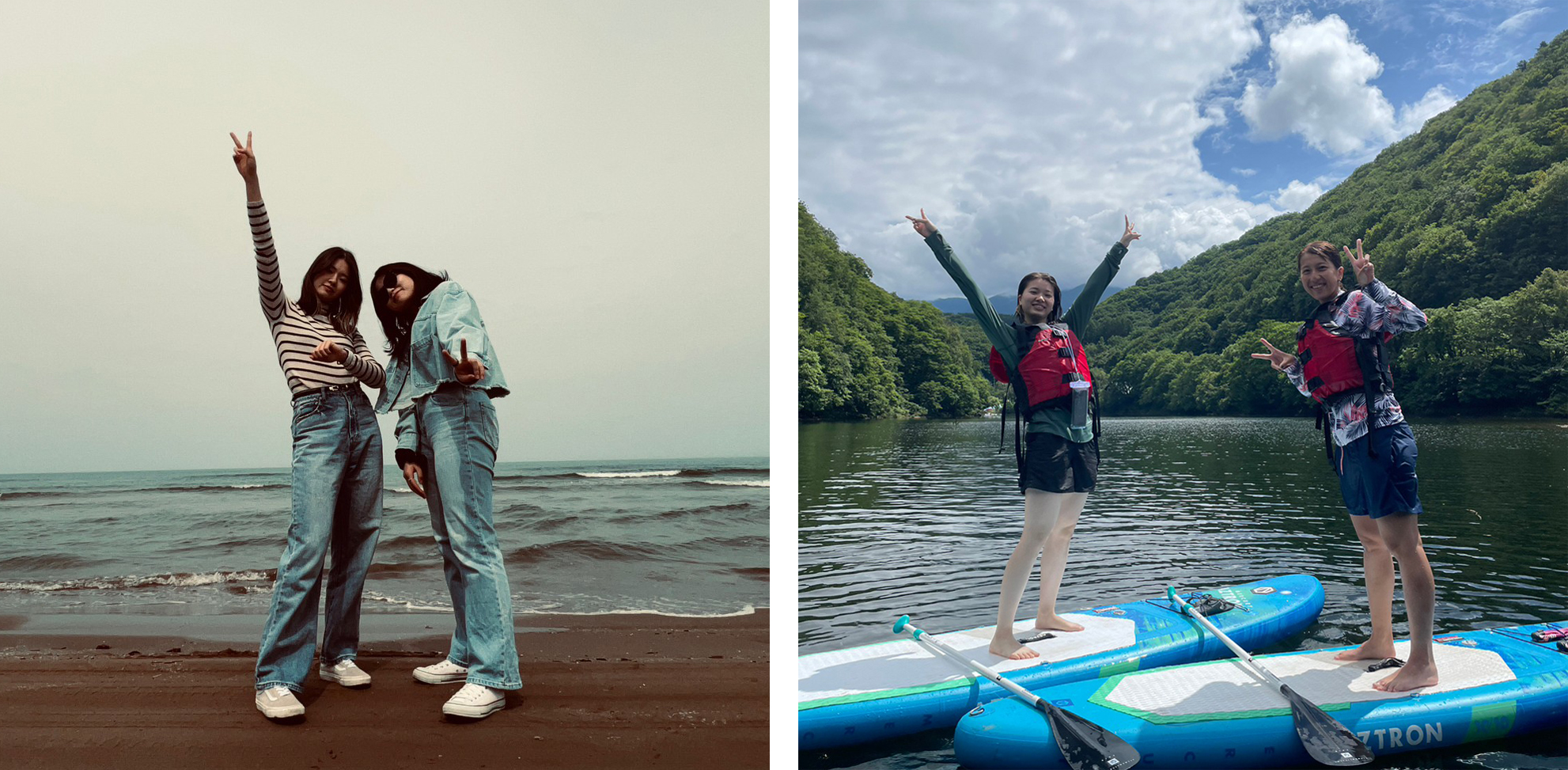

――Do you have any close athlete friends?
It’s Riho Kamezawa from Deaf Table Tennis. We met at the Samsung 2017 Games, and since then, we’ve become so close that I even stay over at her place. She has a 4-year-old daughter now, and I’ve been watching over her since she was born. Kamezawa-san has been participating in the Deaflympics continuously for four editions, starting from Taipei 2009, and I believe she’ll also compete in the Tokyo Games. I love her not only as a friend but also respect her as a senior athlete. I admire how she manages to continue her active career while raising her child.I also used to go to the gym with Honami Kawaguchi, who is a Deaf Track and Field athlete specializing in Javelin throwing. She taught me training methods back then.
――Working five days a week and dedicating your weekends to volleyball practice can be physically and time-wise demanding. If you have any methods or strategies for managing and controlling your physical condition and time, please share.
When I had just started my professional career, there was a period where work wasn’t going smoothly, and I had to work overtime continuously. This led to a decline in my physical condition, and I couldn’t find the time for training. There were even times when I couldn’t keep up during national team training camps. The pressure I felt during this period had a negative impact on my job as well.
At that time, I decided to seek proper medical help and sought advice from people around me. I learned to separate work and volleyball in my mind, recognizing that they were distinct aspects of my life. I made a conscious effort to manage my time effectively. I was fortunate to have understanding superiors, and I learned not to shoulder everything alone but to seek their counsel. This lightened my emotional burden, and gradually, I began to feel better.Up until high school, my schedule was well-structured with set hours for classes and sports activities, such as “after school, it’s time for club activities.” However, when I became a working professional, I had to learn to manage my time independently. I realized that pushing myself too hard could lead to health issues, so I’ve come to appreciate the importance of mental switches and time management.
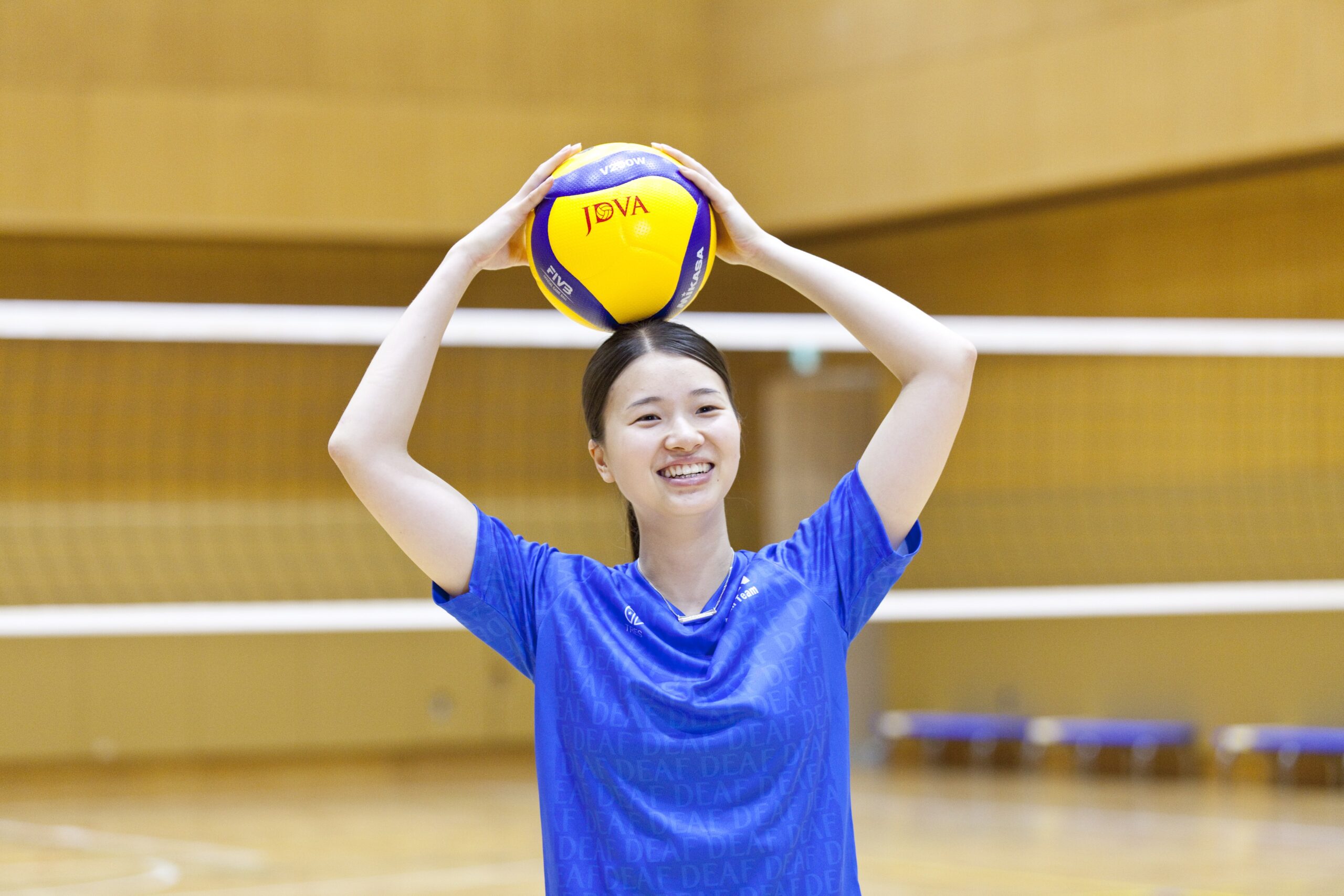
——This August, Haseyama-san was honored with the Minister of Education, Culture, Sports, Science and Technology Award, which is given to athletes who achieve outstanding results in international sporting events. How did you feel about receiving this recognition?
The first time I received an award was after winning the gold medal at the 2017 Deaflympics in Samsung. This time, it was for my performance in the 2021 Deaflympics in Caxias do Sul, even though we had to withdraw from the competition midway, we still achieved a 4th place result. During the award ceremony, there were also famous athletes whom I had seen on TV, and while I am considered an athlete just like them, I couldn’t help but feel a certain “difference.” Of course, I’m proud of my accomplishments as an athlete, but it’s important to note that we are not full-time athletes; we work during the week and play volleyball on weekends. While I want to bring more attention to this prestigious award, it also served as a reminder to think about how we can create a better environment for Deaf volleyball players to train as athletes.
——Finally, could you please share a message with the readers?
The awareness of the Deaflympics is still relatively low, and there are many people who may not be familiar with it. However, with the Tokyo 2025 Deaflympics approaching, I hope that more and more people will come to know about the existence of these games, which are exclusively for Deaf athletes.As a prelude to the Tokyo Games, the Japanese national team will be participating in the Deaf Volleyball World Championships in Okinawa in 2024. There will be various other competitions leading up to 2025, and I would be delighted if you could take an interest and support the Tokyo 2025 Deaflympics with all of us.
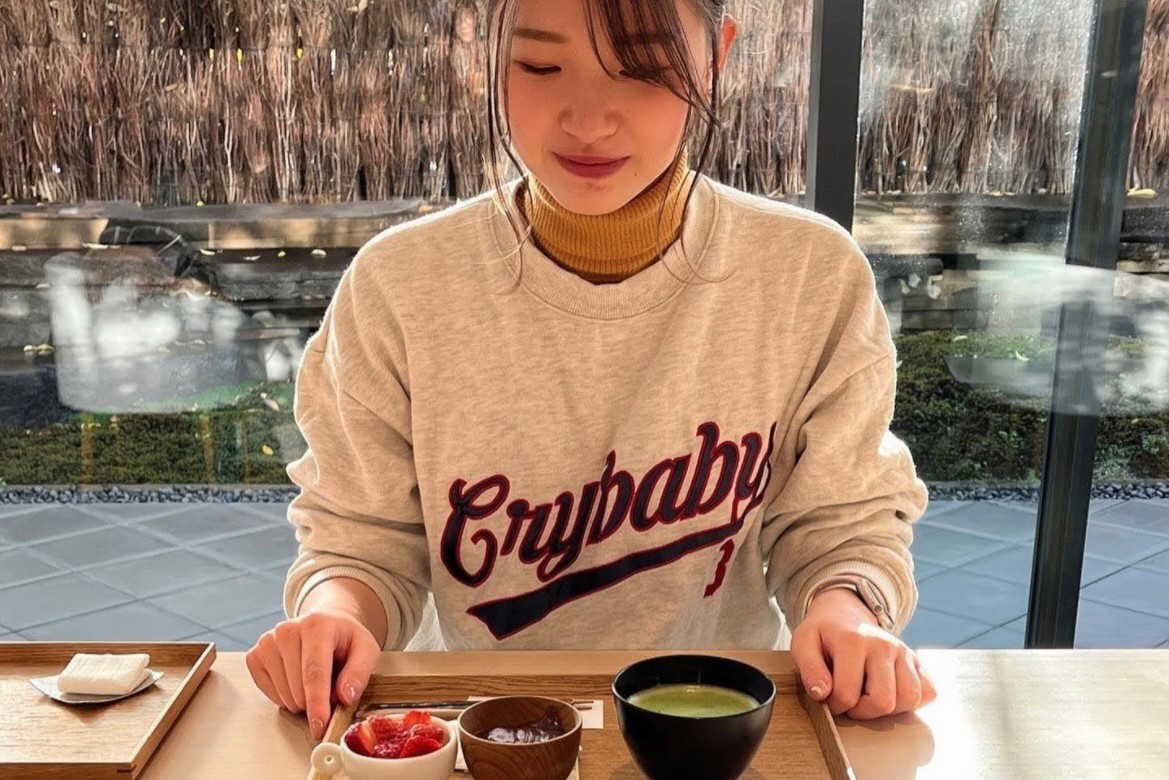
Japan Deaf Volleyball Association:http://www.jdva.jp/
Deaf Volleyball Japan Women’s National Team
Instagram:jdva_woman
Deaf Volleyball Japan Men’s National Team
Instagram:jdva.men
photographs by Hiroshi Takaoka
text by Kaya Okada
interpretation (sign language) by Naoki Okada & Ryosuke Tominaga


